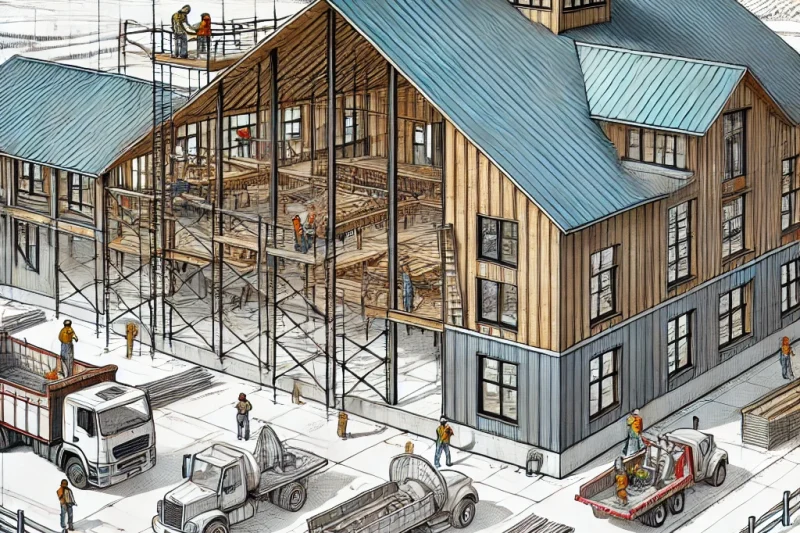USDA Eligibility Guide
“Find out if you’re eligible for a USDA home loan with Smart Mortgage!”
Columbus, IN USDA Loan Eligibility Guide
-
- The home must be located in a USDA-eligible rural or suburban area around Columbus, IN. The USDA provides an online tool to help potential borrowers determine if a specific property is in an eligible area.
- The property must be used as the borrower’s primary residence.
- The home must meet all local codes and program regulations.
2. Applicant/Household Eligibility:
-
- U.S. citizenship or permanent residency is required.
- The borrower must be unable to obtain a loan from other resources on terms and conditions that can reasonably be expected to meet.
- The applicant must have a stable and dependable income, typically verified by two years of consistent employment. The income must also be sufficient to cover the mortgage payment, including taxes and insurance.
- The household’s adjusted income must be at or below the applicable low-to-moderate income limit for the area.
- A reasonable credit history. While a specific credit score is not mandated, a credit score of 640 or higher is typically required for streamlined processing. However, those with lower scores may still be eligible but may undergo a more stringent evaluation.
Questions Call (888)416-4805
Get cash from your home.
Apply to see how a cash out refinance can help you.
Homebuyer Seminars
Discover the keys to homeownership at our local Columbus, IN home buying seminars – your first step towards securing your dream home!
See our home loans.
Explore our diverse range of home loan programs tailored to fit your unique needs!
3. Income Limits:
- Income limits vary by county and household size. You’ll need to check with our Columbus, IN USDA service center or the USDA’s online tools to see specific limits.
4. Loan and Debt Ratios:
- Typically, a 29/41 ratio is followed. This means that 29% or less of your monthly income can go towards your mortgage (Principal, Interest, Taxes, and Insurance) and 41% or less of your monthly income can go towards your total debt (this includes the mortgage and other debt obligations). Exceptions can be made in certain circumstances.
5. Other Requirements:
- Borrowers must personally occupy the dwelling as their primary residence.
- The borrower must be legally able to take on the loan obligation.
- First-time homebuyers are required to take a homeowner counseling class in some situations.
6. Loan Terms:
- The loan term is typically 30 years.
- No down payment is usually required.
- The interest rate can be set by the lender but is subject to USDA review.
7. Guarantee Fee and Annual Fee:
-
- The USDA charges an upfront guarantee fee, which can be rolled into the loan amount.
- There’s also an annual fee, which is a percentage of the remaining principal amount, typically spread out in monthly installments.
It’s crucial to remember that while these are the general requirements for Columbus USDA mortgages, eligibility details can change. It’s always a good idea to consult with one of our Columbus, IN USDA home loan professionals. Get pre-approved with our easy and stress free Columbus, IN USDA home mortgage today.
Do you need a Pre-Approval?
Get a same day Columbus, Indiana USDA pre-approval to shop for your dream home!
Mortgage Resource Center

USDA Loans in Illinois: Benefits, Eligibility, and Popular Cities
Buying a home is a significant milestone, and for many, finding the right loan program makes all the difference. If you're considering Read more
Barndominium Financing Made Easy with iLoanUSDA
Barndominium Financing Made Easy with iLoanUSDA: Your One-Time Construction Loan Solution Barndominiums, the stylish and practical combination Read more
We also provide USDA home loans in the following cities
More About Columbus, Indiana
Columbus (/kəˈlʌmbəs/) is a city in, and the county seat of, Bartholomew County, Indiana, United States. The population was 50,474 at the 2020 Census. The city is known for its architectural significance, having commissioned numerous noted works of modern architecture and public art since the mid-20th century; the annual program Exhibit Columbus celebrates this legacy. Located about 40 mi (64 km) south of Indianapolis, on the east fork of the White River, it is the state’s 20th-largest city. It is the principal city of the Columbus, Indiana metropolitan statistical area, which encompasses all of Bartholomew County. Columbus is the birthplace of former Indiana Governor and former Vice President of the United States, Mike Pence.
Columbus is the headquarters of the engine company Cummins, Inc. In 2004 the city was named as one of “The Ten Most Playful Towns” by Nick Jr. Family Magazine. In the July 2005 edition of GQ magazine, Columbus was named as one of the “62 Reasons to Love Your Country”. Columbus won the national contest “America in Bloom” in 2006, and in late 2008, National Geographic Traveler ranked Columbus 11th on its historic destinations list, describing the city as “authentic, unique, and unspoiled.”
The land developed as Columbus was bought by General John Tipton and Luke Bonesteel in 1820. Tipton built a log cabin on Mount Tipton, a small hill overlooking White River and the surrounding flat, heavily forested and swampy valley. It held wetlands of the river. The town was first known as Tiptona, named in honor of Tipton. The town’s name was changed to Columbus on March 20, 1821. Many people believe Tipton was upset by the name change, but no evidence exists to prove this. Nonetheless, he decided to leave the newly founded town and did not return.
Tipton was later appointed as the highway commissioner for the State of Indiana and was assigned to building a highway from Indianapolis, Indiana to Louisville, Kentucky. When the road approached Columbus, Tipton constructed the first bypass road ever built; it detoured south around the west side of Columbus en route to Seymour.
Joseph McKinney was the first to plot the town of Columbus, but no date was recorded. Local history books for years said that the land on which Columbus sits was donated by Tipton. But in 2003, Historic Columbus Indiana acquired a deed showing that Tipton had sold the land.







